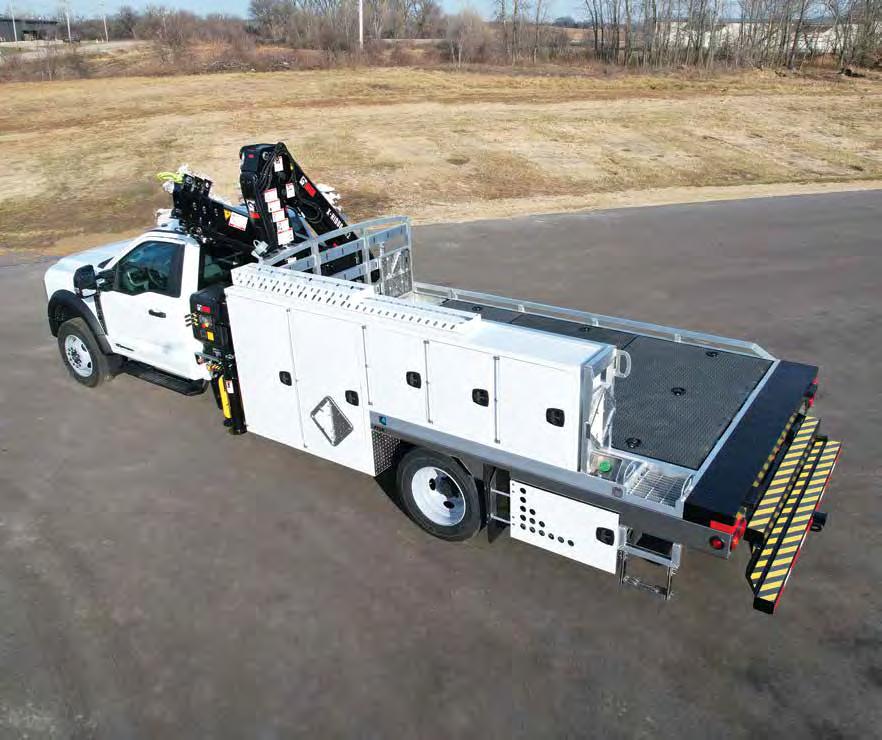Texas




















Finding qualified employees has been a problem for our industry for a while now. If it makes you feel any better, we’re in good company. Most transportation and technical adjacent industries have felt similar pain.
TPGA and ProCOT are collaborating with the GeneratioNext Propane Pros program in our aim to connect your businesses with qualified applicants.
The cost of the service is being covered by ProCOT, so you have no excuses in giving it a try. In addition to a website where you can search for candidates and post job openings (that only applicants can see, not your competitors), there are also educational webinars and outreach sessions.
When you post a job, it does require you to include an hourly wage or salary range as part of its goal of transparency for job seekers. See page 8 for details about the program and what you can do to get started.
Turn to Page 12 for "A Look Back: 1967", which highlights a transformative year for the propane industry in Texas. From navigating the aftermath of Hurricane Beulah to pioneering initiatives like the Building Construction Program, the Texas Butane Dealers Association (TBDA) played a crucial role in shaping the industry's growth and resilience amidst a turbulent time, leaving a lasting impact on propane in Texas and beyond.
Two big dates and events to note (among others). If you or your employees have high school seniors or kids currently pursuing degrees or vocational certifications, make sure they are considering applying for a TPGA scholarship (page 14). The deadline is May 15!
The other big date you should be putting on your calendar is August 1-3 for the Crossroads Propane Expo + Conference in Allen. It’s going to be a fantastic show and you won’t want to miss it.
TPGA staff
Bill Van Hoy ................. bvanhoy@txpropane.com Executive Director
Jackie Mason...................jmason@txpropane.com Education & Marketing Director
Regulatory & Sr. Legislative Affairs Director
Julie Novinger...........accountant@txpropane.com Bookkeeper
Soo Teal ................................ steal@txpropane.com Membership & Meeting Manager
Propane Service Corporation
Soo Teal ................ sales@propaneservicecorp.com Manager 800-392-0023
Publisher
Kim Scheberle ............. kscheberle@austin.rr.com Account Manager/Managing Editor
Sail House Publishing 512-346-0892
Joanne Pantaze ................. jpantaze@zochnet.com
Advertising Sales 512-273-2639
Kiki Pantaze ....................kpantaze@zochnet.com
Art Director 512-924-7566


President: Allen Wells, Wells Propane, 281-332-2630
President Elect: Larry Baty, Cadenhead Servis Gas, 972-771-8654
Secretary: Matt Terry, Matador Gas, 210-560-5418
Treasurer/Finance Chair: Bill Collins, Propane Exchange, 214-629-5118
District 1 Director: David Collett, Gas and Supply, 903-780-2488
District 1 Alternate: Open
District 2 Director: Open
District 2 Alternate: Open
District 3 Director: Open
District 3 Alternate: Open
District 4 Director: Danny Meyers, Bellville Butane 979-865-2698
District 4 Alternate: Matt Peterson, Buster Brown Propane, 281-689-3946
District 5 Director: Brody Newton, Busters Propane, 361-852-8161
District 5 Alternate: Open
District 6 Director: Omar Garcia, Mr. G Propane, 956-581-1063
District 6 Alternate: Alex Hinojosa, Hino Gas Sales, 956-423-9178
District 7 Director: Sharon Seal, Bell Hydrogas, 210-533-7103
District 7 Alternate: Open
District 8 Director: Rodney Sladek, Fayetteville Propane, 979-836-7044
District 8 Alternate: Open
District 9 Director: Brad Quisenberry, Gene Harris Petroleum, 817-295-1091
District 9 Alternate: Larry Hearn, Yellow Rose Propane, 870-648-8241
District 10 Director: Josh Nowlin, McCraw Propane, 9003-583-7481
District 10 Alternate: Chad Gregg, Enderby Gas, 940-482-3225
District 11 Director: Steve Adams, Hardwick LPG, 254-647-3402
District 11 Alternate: Open
District 12 Director: Laci Jo Stone, Schneider Distributing, 800-901-9109
District 12 Alternate: Open
District 13 Director: Lane Worthington, WTG Fuels, 432-682-4349
District 13 Alternate: Casey King, WTG Fuels, 432-894-4240
District 14 Director: Terry Perez, Perez Propane, 512-318-9780
District 14 Alternate: Open
District 15 Director: Don Heinrich, Slaton Gas, 806-828-6501
District 15 Alternate: Open
District 16 Director: Mark Garrison, Fred Garrison Oil, 806-296-6353
District 16 Alternate: Open
Past President: Josh McAdams, McAdams Propane, 936-598-7444
Past President: Mark Peterson, Buster Brown Propane, 281-689-3946
Past President: Jack Walzel, Tri-Co Propane, 254-642-3885
Past President: John Walter, Schneider Distributing, 800-901-9109
Past President: Ben Wood, Northwest Propane, 972-247-6121
Vice President: Steve Adams, Hardwick LPG, 254-647-3402
Vice President: Jeremy Gentile, Hill Butane, 409-296-2001
Vice President: Matt Terry, Matador Gas, 210-861-6545
Sr. Vice President: Todd Dorris, Roadrunner Energy, 830-278-2915
Sr. Vice President: Bill Collins, Collins Propane, 972-442-1078
Sr. Vice President: Joe Green, Green’s Blue Flame Gas, 713-462-5414
Assoc. Supplier Service Director: Rusty Walker, Marshall Young 817-645 9155
Assoc. Supplier Service Alternate: Andy Brus, Crum & Forster 682-220-4812
Assoc. Producer/Marketing Gas Director: Jim Fulton, 4JEnergy 832-529-4768
Assoc. Producer/Marketing Gas Alternate: Open
Assoc. Manufacturer/Distributor Director: Joe Ezernack, Meeder Equipment, 903-877-9401
Assoc. Manufacturer/Distributor Alternate: Troy Hicks, Squibb Taylor 915-613-7534
Assoc. At Large Director: Crystelle Markley, Superior Energy Systems, 512-944-4177
Assoc. At Large Alternate: Jimmie Grant, Martin Gas Sales, 713-851-6155
Nominating Chair: Ben Wood, Northwest Propane, 972-247-6121
NPGA Director: Chad Gray, Dixie LP Gas, 254-582-5359

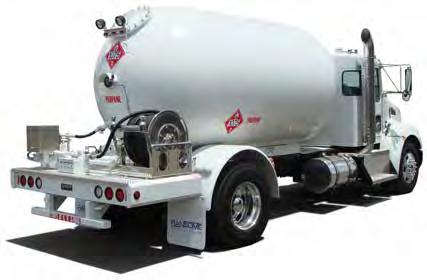






The Propane Council of Texas and the Texas Propane Gas Association have joined forces with the GeneratioNext Propane Pros program to address a pressing issue faced by the propane industry in the Lone Star State – a shortage of qualified workers. As the industry experiences significant turnover with veteran employees entering retirement, the need for skilled professionals becomes more critical than ever. This collaboration aims to connect propane businesses with a pool of qualified applicants, ensuring the industry’s growth and seamless daily operations.

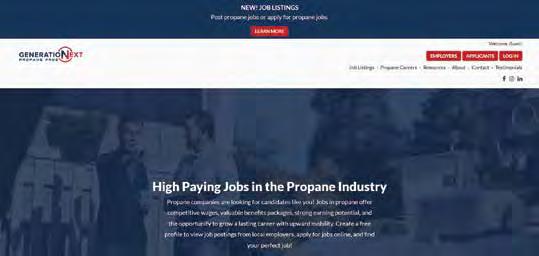
GeneratioNext Propane Pros is a strategic program designed to forge connections between propane and potential employees emerging from relevant technical schools and programs. The program acts as a bridge, addressing the industry’s workforce challenges and providing a platform for propane employers to find qualified candidates.
• L arge Pool of Qualified Applicants: With over 4,400 active and qualified candidates registered nationwide on the platform, and more joining daily, propane businesses gain access to a vast talent pool.
• Targeted Search: Employers can search for potential hires based on specific criteria such as location, experience level, CDL certification, and more.
• Applicant Profiles: Detailed candidate profiles, including resumes, education, and skills, empower employers to make informed decisions.
• Easy Job Posting: Propane businesses can post open positions with clear descriptions, locations, and salary ranges to attract suitable applicants.
• Free Service: There is no cost involved for Texas propane businesses to register and utilize the GeneratioNext Propane Pros platform.
The cost of service is being covered by a Propane Council of Texas (ProCOT) grant.
• User-Friendly Website: The platform, accessible at NextGen Propane.com, provides a seamless experience for employers to manage profiles, search candidates, and post jobs.
• O utreach Sessions: GeneratioNext Propane Pros conducts outreach sessions at
technical schools to introduce the propane industry and attract potential candidates.
• Educational Webinars: Employers and instructors can participate in webinars covering platform utilization and career opportunities in the propane industry.
Texas propane businesses are encouraged to register on the GeneratioNext Propane Pros website to set up their company profiles, access a pool of qualified candidates, and post open positions to connect with potential hires. The program, funded by the Propane Council of Texas (ProCOT), emphasizes transparency in job postings, requiring salary ranges for increased clarity.
• Profile Setup: When creating a profile on NextGenPropane. com, include all company locations to enhance exposure, as applicants can search based on distance.
• Multiple Users: Employers can add multiple users to a single profile.
• Proactive Engagement: Employers can see applicant profiles and job posts, and applicants can view employer profiles. However, employers cannot view each other’s job postings.
• Salary Range Inclusion: When posting a job, including the hourly rate or salary range is mandatory to provide potential candidates with a starting point.
• Participation in Outreach Sessions: Joining outreach sessions increases company exposure and allows employers to share information about their company and available career opportunities.
• Communication with GeneratioNext Propane Pros: It is vital
As Michelle Wilson of the GeneratioNext Program expresses, “I am very excited to work with the Propane Council of Texas (ProCOT) on our GeneratioNext Propane Pros workforce development program to address the growing need for qualified employees in the Texas propane industry. ProCOT members will have exclusive access to the GeneratioNext Propane Pros website platform, NextGenPropane.com. This workforce development initiative plays a pivotal role in connecting students and graduates from local technical schools, CDL classes, adult education programs, and community colleges with employers in the propane industry. By facilitating connections at a local level, the program not only empowers the next generation of propane professionals but also lends crucial support to local propane employers in Texas.”

to inform GeneratioNext Propane Pros about any interactions, interviews, or hires to help maintain the program’s effectiveness.
• NextGenPropane.com: The primary platform for connecting employers with qualified candidates.
• Marketing Materials: Access to social media posts and flyers for promotional purposes.
• Career Fairs: Email blasts with information on upcoming career fairs, offering opportunities for local propane employers to participate and connect with potential hires.
• Feedback and Insight: Insights collected during outreach sessions provide valuable information for company marketing strategies.
GeneratioNext Propane Pros actively shares information about career fairs in Texas through email blasts. While the program cannot directly participate, local propane employers are encouraged to attend these events to find their next hires. Marketers are requested to share event pictures, reach out with feedback, and tag GeneratioNext Propane in social media posts for resharing.
In the words of Tonya Crow, Energy Sales & Marketing Director at GROWMARK / FS Propane, “GeneratioNext Propane Pros is making connections and getting us a front-row seat at CDL and technical trade schools in Illinois. The work they are doing is invaluable in delivering our message to the right group of skilled workers that we need on our payroll in these upcoming years.”

By embracing GeneratioNext Propane Pros, Texas propane companies can overcome workforce challenges, secure a pipeline of skilled professionals, and ensure a thriving future for the industry. The program’s user-friendly approach, coupled with valuable insights and assets for marketers, positions it as a crucial tool in addressing the current workforce shortage in the Texas propane sector.
You can follow Generation Next Propane Pros on Facebook at https://www.facebook.com/GeneratioNextPropanePros.

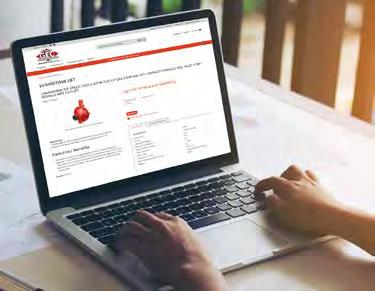



In the midst of a nation grappling with the Vietnam War, civil rights struggles, urban unrest and the emergence of the Summer of Love, 1967 was a year of contrasting challenges and cultural shifts that left an indelible mark on the American landscape. As "All You Need Is Love" by The Beatles resonated as an anthem for the Summer of Love, television screens across the nation were tuned in to shows like "Bonanza," "The Andy Griffith Show," "Gunsmoke," and "Gomer Pyle." In Texas, the year was characterized by natural disasters.
In the Lone Star State, Hurricane Beulah, a powerful Category 5 hurricane, made landfall, leaving a trail of widespread devastation. The aftermath of this natural disaster cost Texas billions of dollars and highlighted the vulnerability of the state to such powerful forces of nature. Simultaneously, severe drought conditions plagued Texas in 1967, exacerbating water shortages and sparking discussions about water management strategies and solutions. This period underscored the growing competition for water resources in a state experiencing population growth.
Amidst these broader societal shifts, the Texas Butane Dealers Association (TBDA) underwent significant developments under the leadership of Monty Stafford of Northern Propane. Stafford's presidency saw the doubling of distribution for the TBDA's consumer magazine, the "Friendly Flame," now known as "Propane Living." Additionally, he implemented a program offering specialty advertising items, such as potholders, telephone dials, and pencils, to help members promote their businesses. The success of this initiative is still evident today, with the TPGA store, PSC, continuing to offer promotional items as a result of Stafford's efforts.

In 1967, the TBDA launched the Building Construction Program, a venture that resulted in a lasting legacy—the TBDA building still stands proudly on a parcel of land in North Austin along the I-35 corridor, prevailing in eminent domain issues.
A significant milestone for the TBDA was the crowning of its first Miss Friendly Flame the previous year. This ambassador played a vital role in representing the association at events like the FFA Convention and the TBDA Convention in 1967, further promoting the propane industry and rivaling Miss Rural Electrification.
The Adolphus Hotel in Dallas served as the venue for the 1967 TBDA Convention, where 602 propane industry professionals gathered to exchange ideas and insights. After a six-year hiatus, the convention also marked the return of the Southwest LP Gas Market, now known as the Crossroads Propane Expo. This event has since evolved into a cornerstone of the industry, fostering connections and innovation.
On the national stage, the year 1967 witnessed pivotal mo-
ments in the propane industry. The futures market for LPG received approval from the board of governors of the New York Commodity Exchange, paving the way for the establishment of a futures market in LP gas. Trading officially commenced in September of that year, marking a significant step forward for the industry.
In the complex tapestry of 1967, where societal upheavals and cultural shifts dominated headlines, the propane industry in Texas and across the nation was undergoing its own transformations. The legacy of Monty Stafford and the strides made by the TBDA during this time continue to shape the industry, providing a foundation for growth, innovation, and community engagement in the decades that followed. As we reflect on this pivotal year, we recognize the resilience of an industry that thrived amidst the challenges of its time, leaving an enduring impact on the landscape of propane in Texas and beyond.
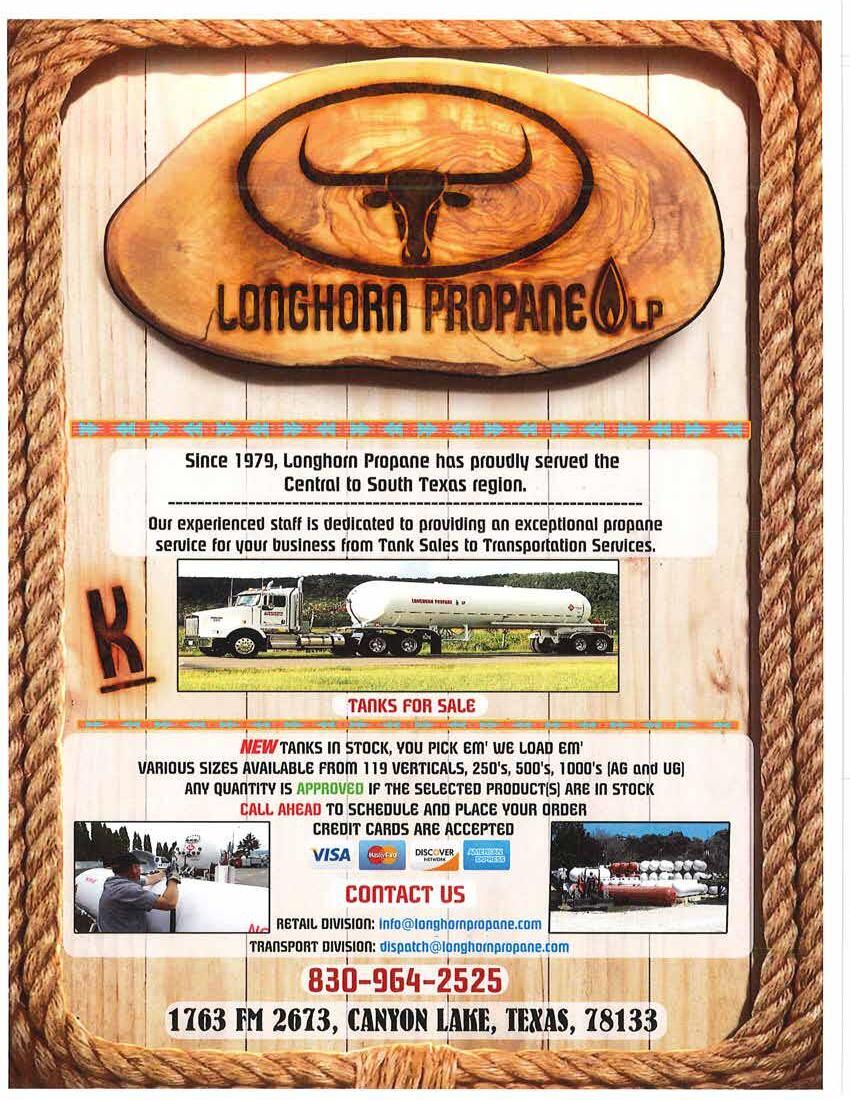

In today's landscape, the pursuit of higher education has become increasingly daunting, with the costs soaring at unprecedented rates. Over the past few years alone, education expenses have surged by approximately 25%, placing immense financial strain on aspiring students and their families. Recognizing this challenge, the TPGA Scholarship Foundation has been steadfast in its commitment to easing the burden of education costs for nearly three decades. Since our inception in 1997, we have diligently supported exceptional students in their academic endeavors, awarding over $200,000 in scholarships. As we embark on the 2024-2025 academic year, we remain dedicated to providing competitive scholarships to deserving students, empowering them to pursue their dreams with financial assistance from the TPGA Scholarship Foundation.
For scholarship winners, the Scholarship award checks are mailed over the summer directly to your educational institution to be applied to tuition & fees and room & board for the academic year. The full award can be applied fully to the fall 2024 semester or divided between the fall 2024 and spring 2025 semesters.
• Has not previously been awarded a scholarship by the TPGA Scholarship Foundation.
• A Texas high school senior or an undergraduate student who completed high school in Texas;
• Plans to be a full-time student for the upcoming 2024-2025 school year in an undergraduate degree program by an accredited college or university or enrolled in a vocational or technical school;
• A student employee or a child or grandchild of an employee of a current member of the Texas Propane Gas Association (TPGA) with dues paid for the 2024 TPGA membership year;
• The qualifying member employee's work must be directly related to the Texas propane industry; &
• GPA (upper half of class for consideration).
All eligible students must submit our TPGA scholarship online application to be entered into the scholarship competition. All required documents can be uploaded directly to the online application.

Completing the NPGA scholarship application will not automatically enter them into the Texas scholarship round. Students must complete the TPGA scholarship application to be entered into the Texas competition.
The deadline to submit all applications, including all required documents, is by 11:59 PM CDT on Monday, May 15, 2024.
Access the scholarship application at https://www.txpropane. com/scholarship.

If the application is successfully completed, the applicant will get an email confirmation.
What information will the student need to complete the scholarship application?
The application includes a short essay question. In addition, the application asks for:
• Please list the name of the TPGA member company with which the student is affiliated.
• Household financial information;
• Information about your extracurricular and community activities;
• Employment history (if applicable);
• ACT or SAT test score report (which can be uploaded directly to the online application); and
• An academic transcript (which can be uploaded directly to the online application)
How are winners selected?
TPGA scholarships applicants are thoroughly reviewed, scored, ranked, and selected by a third-party organization specializing in higher education independent from the association. Applicants are scored based on financial need, academic rigor, extracurricular/community involvement, and writing through a short essay. Scholarship winners will be notified in the summer of 2024.

How is the TPGA Scholarship Foundation funded?
The scholarship foundation is funded through donations from members, our annual silent auction on the Crossroads Expo floor, our annual Kendra Scott Trunk Show, and other fundraisers.












For over 20 years, the Propane Education & Research Council (PERC) has produced an exclusive annual report on U.S. odorized propane sales by market, region and state. Each year we rely on propane professionals like you to provide the data necessary to portray an accurate picture of the industry’s retail sales performance.
If you have previously shared your company’s data for this report, thank you. We know that your time is valuable, and we appreciate your participation. If not, we urge you to do so beginning with the 2023 sales data now being collected.
Starting March 1, please go to propane. com/salesreport and follow the on-screen instructions for completing the report.
Based on feedback from industry members, we have simplified the collection steps and created a secure collection form owned and managed by PERC, rather than a third party. PERC is confident you will find the process less onerous while maintaining the integrity and confidentiality of your submission.
Individual responses are kept CONFIDENTIAL and anonymous. Only summary statistics are presented in the final report, and data is never disclosed to third parties.
Sales reports are due May 15, 2024.
If you have any questions about the 2023 Annual Retail Propane Sales Report, please email salesreport@propane.com or call the PERC office at (202) 452-8975.
The final report is shared on propane.com and incorporated into the National and State Propane Profiles, showing mar- ket trends by state and region.
Help ensure Texas gets its fair share of funding so we can continue programs like:
• Propane Appliance Rebates
• GeneratioNext Program
• Duty to Warn Mailing Program
• Propane Safety Wall Calendar
• Propane Living Newsletter &
• Other marketing, safety and training programs.

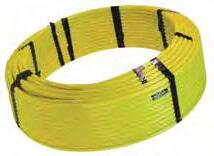




According to the Sales of Propane report published by PERC for 2022, in 2022 U.S. retail odorized propane sales reached 9.84 billion gallons, marking a 3.1% increase from the previous year’s 9.54 billion gallons. This growth was fueled by heightened activity in the residential sector and increased industrial demand following the pandemic. Overall, sales surpassed the ten-year average by 9.8%, reflecting a robust market performance. Propane sales surged across the South, West, and Midwest regions, with Texas emerging as the fourth-largest state in total sales, closely trailing California and cold weather states like Michigan and Minnesota. Notably, Texas led in industrial sales with 60 million gallons and secured the second position in the commercial sector with 135 million gallons.
Texas dominates the U.S. chemical sector non-odorized sales with 3.4 billion of the 4.1 billion gallons sold in the country for the petrochemical market.



And more affordable than ever, starting at just $1.50 a month.
Our monitor offers exciting new capabilities and the accuracy you trust. Gain instant ROI with our award-winning tank level monitor, online portal and free branded mobile app with no upfront costs.
Multi-wireless sensor capable
Robust industrial design
15 + year industry leading battery life
Works with all tanks and software
GPS positioning
The only dual SIM with CATM and NBIOT cellular technology
Five-year warranty
Quick and easy installation
No internet or gateway needed
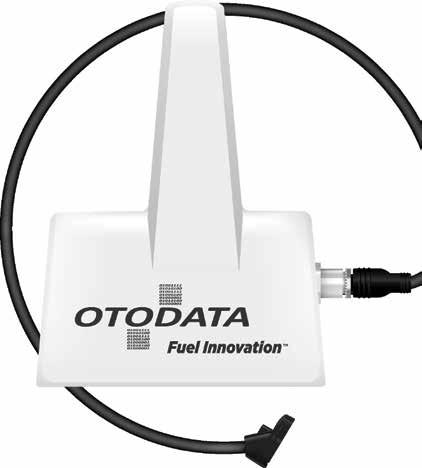

Free branded app and promotional materials
Volume discounts available
No minimum quantities required
No activation fee or hidden costs
Visit us at the Crossroads Propane Expo in Allen, TX August 1th–3rd at booth #310!
1 (844) 763-3344 |
info@otodata.com | otodata.com


On a recent thread online, a propane business owner wrote that they had unknowingly accepted a counterfeit bill. Do you know how to spot a counterfeit bill? How common are they?
Counterfeit bills can be very convincing, and it’s challenging to spot a fake. Counterfeiting may cost the U.S. economy over $200 billion each year. And, it’s not just businesses that are suffering. Ordinary
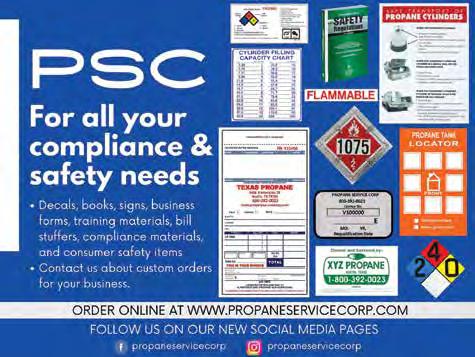
people can also fall victim to fake currency when they pay or get change.
Keep reading to learn how to identify fake currency to protect yourself and your business.
To spot counterfeit bills, it’s essential to understand the physical characteristics of genuine currency. For example, U.S. currency has a distinct look and feel that is difficult to replicate. Therefore, studying real money can help you identify fake bills with ease.
The physical features of genuine currency include paper texture, raised printing, and fine-line printing. The paper used for actual cash is made of a unique blend of cotton and linen fibers, which gives it a distinctive feel. The printing process used for genuine currency is also impressive, with raised printing that is easy to feel when you run your finger over it. Additionally, the actual cash has fine-line printing, which is difficult to replicate with a photocopier or printer.
Studying genuine currency is crucial to being able to spot fake bills. By understanding the physical characteristics of actual money, you can quickly identify any discrepancies when examining a suspect bill. Additionally, if you handle cash frequently, studying genuine currency can help you become more familiar with the bills you regularly take, making it easier to spot any fake bills that come your way.
Watermarks and security threads are two essential security features of U.S. currency that help prevent counterfeiting. Watermarks are images embedded into the paper of genuine currency during the manufacturing process. These images can only be seen when held up to the light. To identify a watermark, hold the bill up to the
light and look for a faint idea of the portrait featured on the account. The watermark should be visible on both sides of the bill, and the image should be crisp and clear.
Security threads are thin plastic strips embedded into the paper of genuine currency. The security thread runs vertically through the bill and is visible when held up to the light. The security thread also has text printed on it, identifying the bill’s denomination. The security thread is an important security feature because it is difficult to replicate accurately.
To spot a security thread, hold the bill up to the light and look for a thin strip running vertically through the bill. The security thread will be visible on both sides of the bill and glow a specific color under UV light, depending on the bill’s denomination.
By learning how to identify watermarks and security threads, you can quickly and easily identify fake bills that lack these features or have poorly replicated versions.
Color-shifting ink and microprinting are two additional security features incorporated into U.S. currency to prevent counterfeiting.
Color-shifting ink appears to change color when viewed from different angles. This ink is used for the denomination numeral on the bottom right corner of the front of genuine currency. The color shift results from the ink containing reflective material that changes color as it reflects light. To identify real cash with color-shifting ink, tilt the bill and observe the color of the denomination numeral, which should shift from copper to green or gold.
Microprinting is tiny text printed on genuine currency and is difficult to replicate accurately. Microprinting is used on various money parts, including the border, serial numbers, and text. The text is so tiny that it appears as a solid line to the naked eye, but when magnified, it becomes legible. To identify micro printing, use a magnifying glass or a microscope to examine the bill closely.
By familiarizing yourself with these security features, you can easily spot fake bills that lack these features or have poorly replicated versions. Genuine currency’s color-shifting ink and microprinting are challenging to reproduce accurately, so any account that lacks these features or has incorrectly copied versions of them is likely to be fake.
The portrait and border of genuine U.S. currency are designed with several features
to prevent counterfeiting. To spot counterfeit bills, it’s essential to identify the unique features of the portrait and the border.
The portrait on genuine currency is engraved and has a distinctive texture. The picture should also have sharp lines proportionate to the bill’s denomination. Additionally, the image should be lifelike and have fine details such as hairlines, facial features, and wrinkles.
The border of genuine currency also has several unique features that are difficult to replicate. For example, the edge

should be clear and unbroken, with sharp, distinct lines. Additionally, the border should have intricate details that are difficult to copy accurately, such as microprinting and fine-line patterns.
The serial number on a bill is an important feature that helps to identify its authenticity. The serial number is a unique combination of numbers and letters printed on each account, and no two genuine bills have the same serial number.

To identify counterfeit bills based on their serial numbers, look for serial numbers that are not correctly aligned, con-
tain unusual characters or symbols, or are printed in an incorrect font. Additionally, if the serial numbers on a group of bills are identical or sequential, this is a red flag that they may be counterfeit.
To check the authenticity of a bill’s serial number, compare it to the serial numbers of other bills of the same denomination. Open accounts will have unique serial numbers printed in the same style and font.
•
•
• it is all yours and more
Let's get started:
1) Go to bergquistinc.com

2) On the homepage...upper right hand corner, Click on the 'Login' button and you are on your way to enjoying all the benefits of your Bergquist

The text and paper quality of genuine currency are both essential features to look for when spotting counterfeit bills. By carefully examining the text and typography on a bill, you can quickly identify fake accounts with blurry or smudged characters, inconsistent typography, or poorly aligned text.
Additionally, by feeling the texture of the paper and examining its color and consistency, you can quickly identify counterfeit bills that lack the unique feel and texture of genuine currency paper.


The text on the genuine currency has specific characteristics that are difficult to replicate accurately, making it an important feature to look for when trying to spot counterfeit bills. The text on genuine currency is sharp, clear, and legible, with no blurry or smudged characters. Additionally, the typography used on real money is consistent and has a uniform style and font.

To identify fake bills based on their text, look for blurry or smudged characters, inconsistent typography, or text not correctly aligned with the rest of the bill.
Genuine currency paper has a unique texture and feels that it is difficult to
licate. The report is made from a blend of cotton and linen fibers and has a distinctively crisp feel. Additionally, genuine currency paper has a consistent texture and color throughout the bill.
To identify counterfeit bills based on their paper quality, look for paper that feels too smooth or too rough, has a different texture or color than genuine currency, or lacks the unique feel of natural currency paper.
A counterfeit detection pen is a popular tool for detecting fake bills. However, reacting with the starch in genuine currency paper creates a dark mark. Limitations include its effectiveness on altered bills.

A counterfeit detection pen is a popular tool for quickly detecting fake bills. It uses a special ink that reacts with the starch in genuine currency paper, creating a dark mark. This ink does not react with the starch in counterfeit bills, which is how counterfeit pens work.
To use the counterfeit detection pen, make a small mark on the bill and wait for the ink to dry. If the spot is dark, the account is likely genuine. If the spot is light or nonexistent, the bill may be counterfeit.
While the counterfeit detection pen can be helpful, it has some limitations. For example, it may not work on bills printed on different paper types or altered invoices. Therefore, it’s essential to use multiple methods to detect counterfeit bills.
While the counterfeit detection pen can
be helpful, it has some limitations. The cell is designed to detect bills printed on standard currency paper, but it may not work on bills printed on different types of paper or altered in some way.
Some counterfeiters have found ways to replicate the starch content of genuine currency paper, making it difficult for the pen to detect fake bills.
Remain Vigilant!
Counterfeit bills can have a significant impact on both individuals and busi-
nesses. By staying vigilant and examining every bill before accepting them, you can help protect yourself and others from the harmful effects of counterfeit currency.
Remember, if you ever suspect a bill is counterfeit, do not accept it and contact the authorities immediately.
Stay alert, stay informed, and stay safe!
Alex Reichmann is the CEO of iTestCash, where he provides retailers around the U.S. and abroad with security and money handling products.

• You will receive good old fashioned customer service.
• You will be educated about your policy coverages and shown where you might be vulnerable.
• You will receive multiple options for your insurance.
“We recommend Marshall Young Insurance to our business associates who are looking for a family style insurance company for their business needs. Whether by phone, email or in person – our concerns are always met with a prompt & courteous response. They are concerned with our service from the beginning to end.”
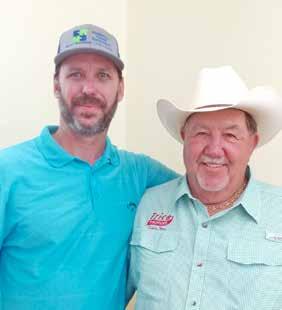



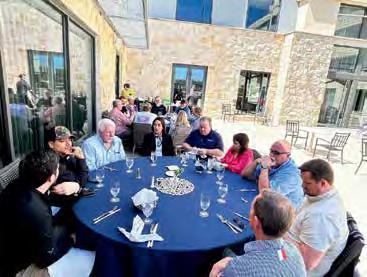





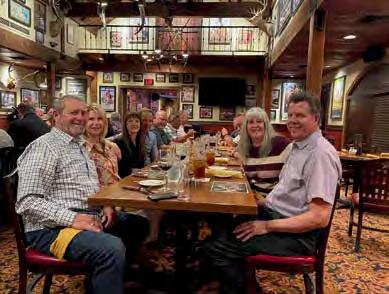
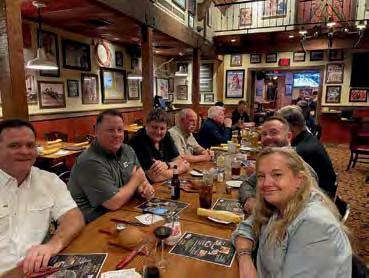

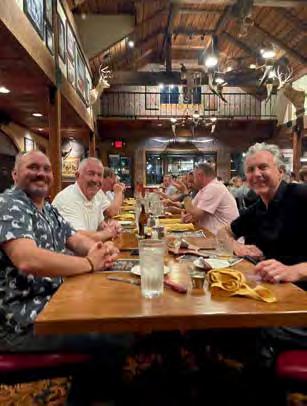




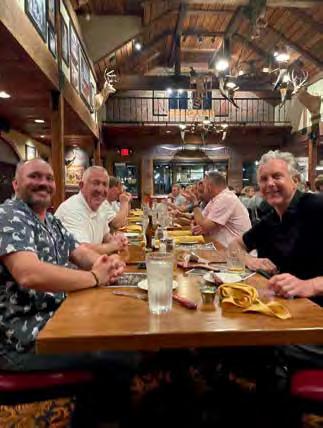
The National Propane Gas Association’s (NPGA) Propane Days, from June 2-4, 2024, combines NPGA’s Annual and Board of Directors Meetings with advocacy on Capitol Hill. Facing legislative and regulatory hurdles, NPGA facilitates direct meetings between members and federal legislators to address critical propane industry issues. The event features a legislative breakfast, briefings on NPGA priorities, congressional meetings and a reception. Attendees will receive tailored advocacy folders based on key issues, committee assignments and locations.


The preliminary advocacy asks cover Energy Choice, Appropriations, National Defense Reauthorization Act, Farm Storage Facility Loan Program, Chemical Facilities Anti-Terrorism Program and Federal Aviation Administration Reauthorization.
NPGA anticipates a significant turnout following the success of Propane Days 2023, with over 200 congressional meetings conducted and over 450 guests, including 15 Members of Congress, attending the reception.
To prepare attendees, NPGA’s Legislative Affairs team will host a webinar in May, covering best practices for Capitol Hill meetings and advocacy priorities. For updates on webinar dates, agendas and hotel information, watch for announcements from NPGA on its website and in the NPGA Bobtail and TPGA Messenger newsletters. For inquiries, contact Michael Baker, NPGA’s chief legislative officer, at mbaker@npga.org.
Alice Catrina Solomon, 89, was born on December 17, 1934, in Gorman, Texas. She passed away on February 18, 2024, in De Leon, Texas. Alice attended school at De Leon High School. She worked for Thomas Propane. Our thoughts are with her family.

Rebecca Rene Renner Brooker Skidmore passed away February 14, 2024. René worked as a secretary for Santo Propane for 27 years. Upon retirement she met Larry Skidmore and married in Las Vegas in 2006. Together they lived in Joshua, Burleson then moved to Gold Canyon, Arizona where she spent her final two years.

Billy Morris, 91, of Tyler, passed away February 14, 2024, at his farm under the care of hospice. He held the position of office manager/accountant with Homer Pittman Gas Company, part ownership of Glo-Flame Propane Company, and sole owner of Blu-Flame Propane Company until he retired in 1997. Billy was known as Dad, Papa, Papa Billy, Great Papa, and “Soapie”. He enjoyed his family, gardening and working with his hands. Our thoughts are with his family.

Lenart L. Zapalac of Columbus, Texas, passed away February 16, 2024. Born on December 13, 1936, in the welcoming town of Columbus, Lenart was a beacon of faith and kindness throughout his earthly journey. For over four decades, Lenart worked at Fayetteville Propane, dedicating 46 and a half years to providing warmth and light to the homes of his community. His work was not merely a job but a calling, embodying his belief in service and reliability. They became his second family.
The Propane Education & Research Council has introduced a new Double Propane Farm Incentive Program, offering up to $10,000 in savings on eligible propane-powered farm equipment for agricultural operations impacted by the recent Texas wildfires.
From now through December 31, 2024, affected producers in Texas and parts of Oklahoma who apply for the Propane Farm Incentive Program can earn double the incentive amount for qualifying propane-powered equipment. Eligible equipment includes irrigation engines, building/water heating systems, power generators, and flame weeding systems.
“Devastating wildfires like this can quickly cripple a farm’s operations and finances,” said Michael Newland, director of agriculture business development at PERC. “As producers work hard to recover and rebuild, we hope that this program can help replace essential equipment lost to the fires.”
With this program, applicants can receive twice the standard incentive amounts for $600 per liter of fuel displacement for propane-powered irrigation engines, up to $60/kW for generators, $3,000 for flame weeding systems, and $4,000 for agricultural heaters.
Applications will be verified by zip code and National Weather Service data. Apply now at Propane.com/ FarmIncentive.
To learn more about propane’s role in agriculture, visit Propane.com/ Agriculture. To learn more about propane and PERC, visit Propane.com.

Great cause! Good times! Registration open. Register for the Tom Garner Memorial Bowling Tournament!
When: Thursday, May 9, 2024.
Where: Bowlero Willowbrook (AMF Willow Lanes), 19102 State Highway 249 Houston, TX 77070.
Mark your calendars and start putting together your teams. The tournament will have 32 lanes and 32 teams! The LPG Charity anticipates all lanes to be filled like last year, so please don’t wait if you want to register a team.
All proceeds benefit the LPG Charity Fund. The fund is a national charity based in Texas benefiting the propane industry. The LPG Charity Fund's principal objective is to assist members of the LPG and Gas Processing industry during a time of catastrophic medical expenses and/or financial need.
Should you have any questions, please feel free to contact Ben Scriber at bscriber@opisnet.com.
MARKETER
Sealy Appliance & Butane Sealy, TX
Worthington Industries Columbus, OH
www.worthingtonenterprises.com

Matt Brock has been appointed as the new regional sales manager for the southeast at Marshall Excelsior Company (MEC), a TPGA member company specializing in LPG and NH3 equipment. With over 13 years of experience in the propane industry, Brock brings a wealth of knowledge to the external sales team, having previously served as the director of operations at McAdams Propane for the last three years.
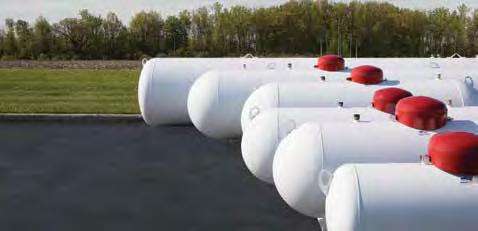
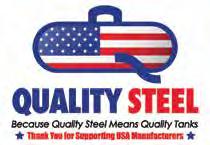
PetroStar Equipment Resources
Purchase & Sale Pre-Owned
Propane Tanks
5,000 gallons to 90,000 gallons FOR SALE
30,000 gallon, 250 psi
(3) 50,000 gallon, 275psi
Contact: Jim Oliver
936-755-6108
petrostar@pdq.net
We have professionally refurbished vapor meters with pulsers for sale.
To electronically send the readings to your office, the pulsers are required.
(15) American model AC250 with pulser installed $180 each
(12) American model AL425 with pulser installed $425 each
(36) AC 250 meter bars $85.00
(25) AL425 meter bars $100.00
We also have some used vapor meters available. Delivery available in Texas / Oklahoma Sam Fox 972-782-7533



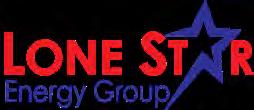



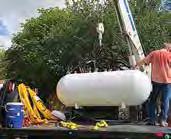
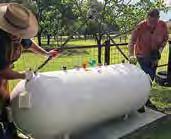

Heading east on Interstate 40 toward Nashville International Airport, a gleaming, glass-fronted building signals to motorists that they could be driving a Ferrari instead.
Prancing Horse of Nashville is Music City’s first standalone Ferrari dealership and one of only 41 in the U.S. The 43,400-square-foot facility features a two-story showroom with a gentle arching roof resembling the iconic flying buttress of the Ferrari 599 GTB and a glass façade displaying luxury sports cars visible from the freeway.
Dream Motor Group tapped Crain Construction to build the Ferrari project based on designs by PRAXIS3 architects, but Prancing Horse of Nashville was unlike any dealership the construction firm had built before, including shops for Toyota and Lexus. Project manager Jeff Kurzhal likens it to more of a museum where the cars are the art.
At the Atelier Studio, buyers can customize their Ferraris with options like wheels, paint, seats and stitching. The showroom features a unique structural glass floor system, offering clients below views of the undercarriages of Ferraris parked above, facilitated by a vehicle lift. Quality con-
struction materials from various countries, including Italy, Spain and France, were carefully chosen to embody the luxury essence of the brand.
The 14-acre site situated along a busy interstate offered ample visibility, but it presented a challenge: The property had minimal infrastructure. Extending a natural gas line would have been cost-prohibitive. That’s why the developers opted for clean-burning propane.
Ferrellgas supplied two 1,000-gallon tanks to fuel the facility’s 12 HVAC rooftop units. Various-sized Trane RTUs provide a combined 1.62 million Btu per hour. The nine-bay service department has a designated HVAC system with an industrial exhaust for air-quality control. Otherwise, the units are zoned to supply varying temperatures to the showroom, sales offices, and inventory garage, delivering maximum comfort and optimal efficiency. Digital controls make it easy to adjust temperatures remotely.
While Prancing Horse of Nashville was under construction, Ferrellgas buried two 1,000-gallon propane tanks that fuel the facility’s heating system.
“The general manager can log in to the building’s automation system and set the points on all the different zones,” Kurzhal says. “He’s really happy with the systems we have in place.”
During a winter that included a storm that plunged temperatures into the single digits, the propane heating system proved out. Ferrellgas tracks propane levels remotely via tank-monitoring software and schedules refills automatically when capacity drops to 40 percent. Rick Warren, Ferrellgas account manager, reported no complications over the course of the heating season.
“We’ve kept a pretty good eye on this high-profile project to ensure the propane system performed flawlessly. The monitoring system worked great,” Warren says. “There was no reason to think that natural gas would be any better than our service is here.”
The propane tanks were installed underground to support the showroom’s sleek aesthetics. Likewise, the RTUs are on the roof’s lower level, out of view from below.
“Prancing Horse of Nashville, he adds, stands as a testament to propane as an alternative fuel that helps developers build where they want to. Any project off the beaten path like this, propane is certainly your top option,” Warren adds.
Modified from its original version from the Propane Education & Research Council.

